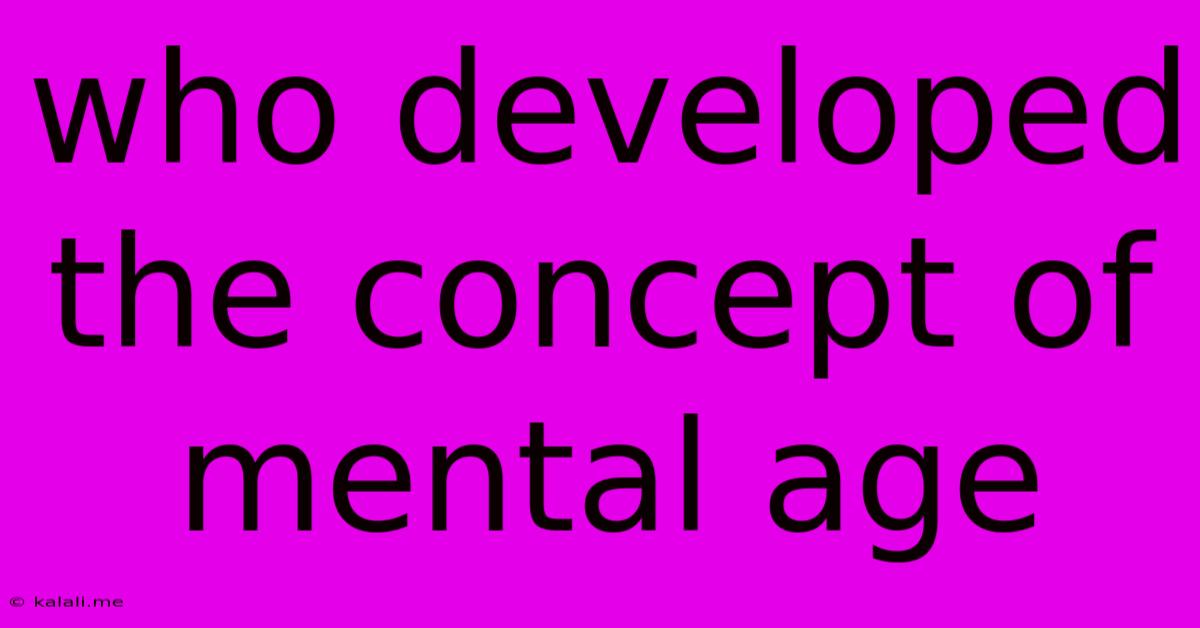Who Developed The Concept Of Mental Age
Kalali
Jun 13, 2025 · 3 min read

Table of Contents
Who Developed the Concept of Mental Age? Unlocking the Legacy of Alfred Binet
The concept of mental age, a cornerstone of early intelligence testing, revolutionized how we understand cognitive development. But who was the brilliant mind behind this groundbreaking idea? The answer is Alfred Binet, a pioneering French psychologist. This article delves into Binet's contributions, exploring his work, the context of its creation, and its lasting impact on the field of psychology.
Understanding mental age requires understanding its context. In the early 20th century, France faced a critical challenge: identifying students who needed specialized educational support. The French government commissioned Alfred Binet and Théodore Simon to develop a method for distinguishing children who were struggling academically from those who simply learned at a different pace. This was the genesis of the Binet-Simon scale, the first widely used intelligence test.
Binet's Groundbreaking Approach: Beyond Chronological Age
Binet's innovative approach shifted the focus from simply measuring a child's chronological age to assessing their cognitive abilities. He proposed the idea of mental age, which represents the average intellectual capacity of a child at a specific chronological age. For example, a child with a mental age of 8 performs intellectually at the level of an average 8-year-old, regardless of their actual age.
This crucial distinction allowed educators to identify children who were significantly behind or ahead of their peers in terms of cognitive development. The Binet-Simon scale used various tasks, such as problem-solving exercises and memory tests, to assess a child's abilities and assign a mental age score.
The Binet-Simon Scale and its Impact
The Binet-Simon scale was not without its flaws, and it was later revised and adapted by others, most notably Lewis Terman, who created the Stanford-Binet Intelligence Scales. However, the core concept of mental age, introduced by Binet, remained a fundamental element of intelligence testing for decades. It provided a crucial framework for understanding individual differences in cognitive development and paved the way for the development of more sophisticated intelligence tests.
Beyond the Numbers: Binet's Vision
It's essential to remember that Binet's work was driven by a deep commitment to helping children. He cautioned against using the intelligence scale to label children permanently or to make rigid judgments about their potential. He emphasized the importance of education and environmental factors in shaping cognitive development. His emphasis on the malleability of intelligence contrasted with later interpretations that sometimes rigidly categorized individuals based on IQ scores.
Legacy and Continued Relevance
While the specific methods of measuring intelligence have evolved significantly since Binet's time, the core concept of mental age remains a valuable contribution to the field of psychology and education. It highlighted the importance of assessing cognitive abilities relative to age norms, facilitating early intervention and individualized learning strategies. Binet's work continues to influence how we understand and support the diverse learning needs of children and adults. The concept of mental age, therefore, is a lasting testament to Alfred Binet's pioneering work and insightful approach to understanding human intelligence.
Latest Posts
Latest Posts
-
For This Truss Determine The Number Of Zero Force Members
Jun 14, 2025
-
Lewis Dot Structure For Maleic Acid
Jun 14, 2025
-
In A Human Population Undergoing The Demographic Transition
Jun 14, 2025
-
Common Multiple Of 30 And 42
Jun 14, 2025
-
Difference Between Implied And Express Contract
Jun 14, 2025
Related Post
Thank you for visiting our website which covers about Who Developed The Concept Of Mental Age . We hope the information provided has been useful to you. Feel free to contact us if you have any questions or need further assistance. See you next time and don't miss to bookmark.